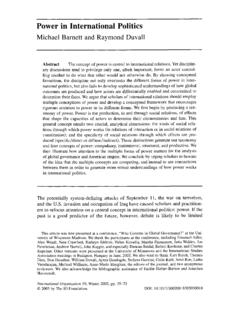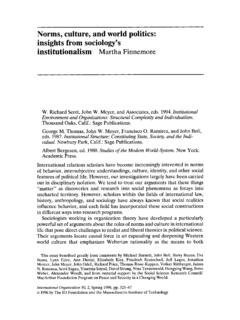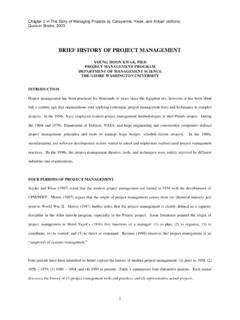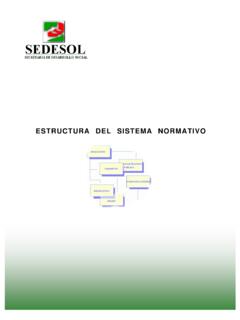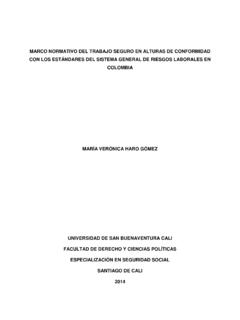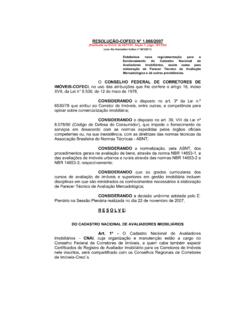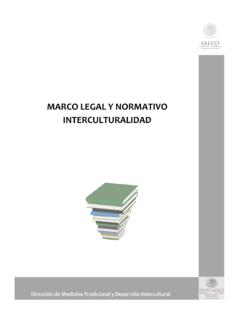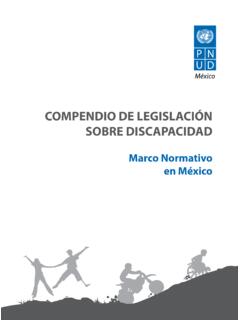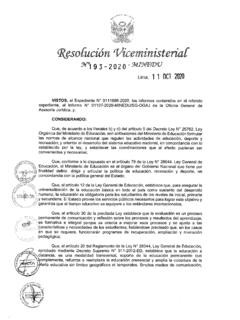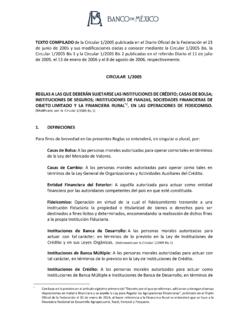Transcription of International Norm Dynamics and Political Change
1 InternationalNormDynamics and PoliticalChange Sikkink andKathryn MarthaFinnemore Normative andideationalconcernshave alwaysinformed thestudyofinternational politicsandarea consistentthreadrunning through thelifeofInternational Organi- was founded,dominant realistviews of politics,whilerejecting idealism,wereverymuchconcernedwithissues of legitimacy and earlyCold War,afterall, was notsimplya positionalconflictamonganonymous greatpowers:it was a war for"heartsand minds."The couplingof powerwith "legitimate socialpurpose"was centraltoAmericanforeign policyof thisperiod.'. At the same time, International relationsscholarswerebusystudying two of the greatestsocialconstructionprojectsofthea ge: Europeanintegration anddecoloniza- ,liketherealists,wereconsciouslytrying to distancethem- selvesfrom"idealist"predecessors (inthiscase,David Mitrany andhiscolleagues), butthecomplexweboftechnical tasksthattheydesignedaimedatmorethanprom ot- ingmaterialwell-being;theyaimedultimatel y at ideationaland social overwas supposedtodo morethancreateadditional technicaltasks;itwas supposed tochangeattitudes, andaffect identity, amongparticipants.
2 Likewise,scholarsrecog- nizedthatdecolonization was drivenby a profoundly normative agendaand thatit explicitlysoughttoreconstitutetheidentit ies ofboththenewstatesandtheirformer colonizers,as wellas therelationshipsbetweenthem. Attempts inthe1960sand 1970stobuilda scienceofpoliticsmodeledoneconom- ics ornaturalscienceneverdisplacedthesenorma tive andideationalconcernscom- surfacedconsistently in thestreamof critiquesof thedominant state-centricparadigmsthatfocusedon transnational relationsin the 1970scalled attention to transnational actorswho weresometimes influenced oftheearly1980ssimilarly Wewouldliketothankthethreeeditors,tworev iewers,andEmanuelAdler,MichaelBarnett, Elizabeth Boyle,AudieKlotz,JeffLegro,RichardPrice, ThomasRisse,andDaniel Thomasfortheirveryhelpful comments of themanuscript.
3 On variousdrafts to JamesFearon,KurtGaubatz,and We arealso grateful JimMorrowforanswering sharing questions, manuscripts, relatedtoourwork. andmakingsuggestions 1. Ruggie1983b. 2. KeohaneandNye 1971. 52,4, Autumn1998,pp. 887-917. Organization International ? 1998byThe 10 Foundation andtheMassachusetts ofTechnology Institute 888 International Organization emphasized theroleofprinciples andnormsin waysthatopenedthedoorfora more sweeping"ideationalturn"inthelate1980s. Elsewherein thisissueJohnRuggie,JamesMarch,andJohanO lsenexplorethe intellectualhistory of thisrecent"turn"and locateitsproponents in themoreab- stracttheoretical debatesof social theircontributions, we ad- dresstheoretical issuesfacingthoseofus interested in empiricalresearchon social construction processesand norminfluences in are con- cernedwithsuchquestionsas How do we knowa normwhenwe see one?
4 How do we knownormsmakea difference in politics?Wheredo normscomefrom?How do theychange?Weareparticularly interestedintherolenormsplayinpoliticalc hange- boththeways in whichnorms,themselves, changeand the ways in whichthey changeotherfeatures frameworks in internationalrelations (IR), muchofthemacrotheoretical equipment ofconstructiv- ismis better at explaining to "log- ics of appropriateness"3 say littleabouthow standardsof appropriateness might areparticularly unsatisfyingduringthecurrent era of global transformation whenquestionsaboutchangemotivatemuchof the empiricalresearchwe do. Lackinggood macrotheoretic guidance,ourapproachto thesequestionsreliesheavilyon induction fromtheextensiveandgrowingbodyof normsresearchthathas sprungup,notjustin politicalscience,butin law,econom- ics, sociology,andpsychology.
5 Thisvariety ofconceptualandempiricalmaterialis usefulforourinductiveenterprise, butit also raisessome important questionsfor macrotheory thatwe exploreattheendofthearticle. We use ourreviewof scholarship on normsandrelatedideationalphenomena in thisarticleto makethreearguments. First,theideational"turn"of recentyearsis actuallya return to sometraditional concernsofthediscipline, butithas notbrought us backtoprecisely thesameplacewe forgoodempirical research havechangeddramatically (andforthebetter)sincethefounding ofIO, andapplying thesestandards to long-standing normative issueshas had realpayoffs. Second,we generatesomepropositions aboutthreeaspectsofnorms-theirorigins, themecha- nismsbywhichtheyexerciseinfluence, andtheconditions underwhichnormswill be influentialin , we arguethatnormsevolvein a pat- terned"lifecycle"andthatdifferent behaviorallogicsdominatedifferent segments ,we arguethatthecurrent tendency to opposenormsagainst rationalityorrationalchoiceis nothelpfulin explaining manyofthemostpolitically salientprocesseswe see in empiricalresearch-processeswe call "strategic social construction," in whichactorsstrategize rationallyto reconfigurepreferences,iden- tities, Rationalitycannotbe separated fromanypoliticallysignifi- cantepisodeofnormative influenceornormative Change .
6 Justas thenormative con- textconditionsany episode of rationalchoice. Normsand rationality are thus intimately connected, butscholarsdisagreeabouttheprecisenature oftheirrelation- 3. MarchandOlsen,thisissue. 4. See Kahler,thisissue,fora history ofdebatesoverrationality relations. ininternational NormDynamicsandPoliticalChange 889. identify fourfocalpointsof debatewheretherelationship betweennorms and rationality is leastunderstoodand mostimportant, and we showhow thesede- batescross-cutresearch traditions inpotentially fruitful ways. The Returnto Norms Normsandnormative issueshavebeencentraltothestudyofpolitic sforatleasttwo withquestionsnotonlyaboutthemean- ingofjusticeandthegoodsocietybutalso abouttheinfluence onhumanbehaviorof ideas aboutjusticeand good.
7 Our conclusions(or ourassumptions) abouttheseis- suescondition andPlatounderstood thisin thefourth century just as E. H. Carrdid in thetwentieth becomecanonizedin thedisciplineas a debunkerof Wilsonianidealism,butthis simplificationmisrepresents hismessage:"Politicalactionmustbe basedon a coor- dinationofmorality andpower."Realismfails,in Carr'sanalysis,precisely because itexcludesessentialfeatures ofpoliticslikeemotionalappealto a politicalgoal and grounds Thisconviction thatunderstanding socialpurposeand legitimacy was essentialto understanding politicscontinuedthrough the1950sand 1960s and is evidentin thepages of IO. Inis Claude's workon thelegitimation scholarship on certainissues-decolonization, humanrights, education-recognized thatmuch UN activity involvedestablishing norms,butitoftenfailedto theorizethesenorma- theworkof theintegration theorists suchas ErnstHaas was implicitly, andoftenexplicitly, Evenreal- istslikeHans Morgenthau wroteextensively aboutthewayin whichideationaland normative factorssuchas nationalism, morality,and International law limitstates'.
8 The "turn"awayfromnormsandnormative concernsbeganwiththebehavioral revolutionand itsenthusiasm formeasurement. Normative and ideationalphenom- ena weredifficultto measureand so tendedto be pushedaside formethodological was reinforced bytheemerging infatuation ofpoliticalscien- tistswitheconomicmethodsin thelate 1970sand thepursuitofpoweras "utility maximization" and,following theeconomists, tended to specifyutility functions in microeconomic analysesofcollectiveactiongames(Prisoner s' Dilemma,StagHunt)toreinvigorate theirlong-standingdebatewithrealistsands howthatcooperation, welfareimprove- 5. Carr[1946] 1964,97, 89. 6. Claude 1966. 7. See Kay 1967;Henkin1965;Jacobson1962;andBall 1961. 8. Haas 1961, argument relatedto someconcernsofthisarticle,see Haas 1993.
9 9. Morgenthau [1948] 1985, , 6. 10. Fora discussionaboutthecausesandeffects ofthedominance ofeconomicmodelsandmethods in politics,see Lowi 1992;Simon1993a;Lowi 1993a,b;andSimon1993b. 890 International Organization ment, and"progress" werepossibleevengivensomeofrealism'spess imistic assump- tionsaboutself-seeking fact,these"neos,"bothrealistandliberal, mightmoreappropriately be called "econorealists"and "econoliberals," sincewhat was newinbothcases was an injectionofmicroeconomic insights.'1. Althoughthemoveto rationalchoicein no way requireda moveto a material ontology, itsproponents showedlittleinterestinideationalorsocial phenomena, and studyoftheseissueslanguished ,wheninterest in these matters revivedin the1980s,first withtheregimesprojectl2 andlaterwiththecon- structivistsled by JohnRuggie,FriedrichKratochwil, AlexanderWendt,and oth- ers,'3thedisciplineto whichnormsreturned had changedin important thoughthebehavioralrevolution and the"economicturn"of the 1970sand 1980s mayhaveneglected norms,theymadeimportant contributions byforcing scholarsto thinkmuchmorerigorously aboutissuesofresearch design,theoreticalclarity,disci- plinary cumulation, andparsimony.
10 As contemporary researchers maketheirarguments aboutnorms, culture,andideas, theywill need to specifyideationalcausal claimsand mechanisms clearly,think seriouslyaboutthemicrofoundations on whichtheoretical claimsaboutnormsrest, andevaluatethoseclaimsin thecontextofcarefully designedhistorical andempiri- cal research.'4 David Lumsdaine'sanalysisof therole of morality in International politics,forexample,is verydifferent fromCarr' to illustratehis arguments aboutthemoralcharacter of "the ordinary man" and the politicalconsequencesof thatmorality. The resultis a brilliantpiece of Political thought butone vulnerableto chargesof wishfulthinking, sinceCafrprovidesno systematic evidencethathumanbeingsactuallydo behaveas his "ordinary man"". does and notaccordingto someotherconceptionof ,by contrast,offers evidencethatmorality systematic actuallydoesplaya significant role inforeign aid byexamining predictions fromalternativeexplanations andcompiling extensiveevidence,bothquantitative and qualitative, to arbitrateamongexplana- tions.
